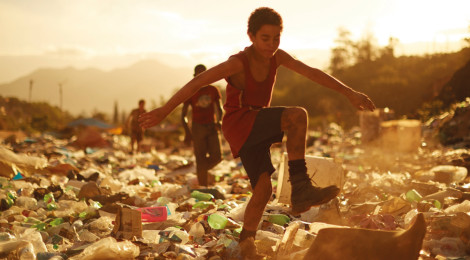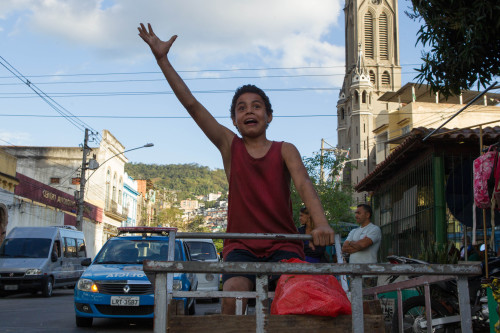
Stephanie Dennison on TRASH
Mediático is thrilled to present a review of the new UK-Brazil film co-production Trash: A Esperança Vem do Lixo by Stephanie Dennison, Reader in Brazilian Studies at the University of Leeds. Dennison is co-author with Lisa Shaw of two monographs on Brazilian cinema (Popular Cinema in Brazil, MUP 2004 and Brazilian National Cinema, Routledge 2007). She co-edited Remapping World Cinema: Identity, Culture and Politics on Film, Wallflower 2006 and Latin American Cinema: Essays on Modernity, Gender and National Identity, MacFarland 2005. She was co-editor of cinema journal New Cinemas (Intellect) 2010-11. She recently edited Contemporary Hispanic Cinema: Interrogating the Transnational in Spanish and Latin American Film, Tamesis 2013 and World Cinema: as novas cartografias do cinema mundial, Papirus, 2013. She is currently working on a collaborative project examining the role of film in the soft-power strategies of BRICS nations.
On Trash: A Esperança Vem do Lixo
By Stephanie Dennison
Trash, Stephen Daldry’s long-anticipated foray into ‘international’ filmmaking, finally hit UK screens on 30 January. The film is a relatively faithful adaptation of children’s fiction writer Andy Mulligan’s novel of the same name which was first published in 2010. Despite being dropped from the Blue Peter shortlist for best fiction award for containing one violent scene and the word “shit”, the book is a firm favourite on UK school reading lists (it’s how I came to know about it: my 11-year-old read it and loved it). It’s a fast-paced adventure story set in an unnamed underdeveloped country (but for many, it’s unmistakeably The Philippines, where Mulligan works as an English teacher) with three child protagonists who take it in turns to tell the tale of how they found a wallet in the rubbish dump where they work, how the key inside it eventually led them to a fortune stolen by a political dissident from a corrupt politician, and how they were able to trick fate and gain access to a better life as a result. In Mulligan’s words, the book “asks children to engage with brave, fierce streetkids who dare to take on a dangerous world. They win, and in the process grow.”
The adaptation is the brainchild of Kris Thykier of UK-based Peapie Films, a production company which, according to its website, has the ambition to a) make UK films with international appeal and b) to position itself “as an able producer in local language in foreign territories”. With Working Title on board (Stephen Daldry to direct; Richard Curtis to script), and parent company Universal set to distribute worldwide, Fernando Meirelles’ Brazil-based O2 Filmes were approached with a view to setting the film adaptation in Rio de Janeiro, with a handpicked cast of Brazilian megastars (Selton Mello; Wagner Moura) and new talent (the streetkids, of course). With a keen eye on the massive potential that the Brazilian domestic market presents (with audiences of upwards of five million for the most successful domestic products), the film was to be shot almost entirely in Portuguese. As Thykier put it: Language is not the issue it once was. There’s an audience willing to accept that people speak in different languages.”
Trash joins only a handful of movies to be co-produced by the UK and Brazil, a list which includes another landfill-based film: Lucy Walker’s Oscar-nominated documentary Waste Land (2010) which depicts the lives of litter pickers in the world’s largest rubbish dump, Jardim Gramacho in Rio de Janeiro, and the efforts of artist Vik Muniz to both capture and transform their lives through art. It is expected that the numbers of co-productions will increase considerably once the UK-Brazil co-production Accord of 2012 is ratified. Meanwhile, Universal Germany were brought into the Trash project as third-party co-producers, in order to facilitate the co-production process, given that an Accord between Brazil and Germany has been up and running since 2008, and because it is notoriously difficult to co-produce films in Brazil without an Accord. Universal in turn co-produced Trash with the UK under the aegis of the Council of Europe Co-Production Treaty.
In terms of the generation of an appropriate paracinematic narrative pre-and post-film release in order to garner attention and boost sales, producers and director have played their parts accordingly. Newspaper reports explain that Thyker bought the rights to the best–selling children’s novel and reportedly sent it to Richard Curtis, with whom he had previously worked. Both Thyker and Curtis fell in love with the story and saw the potential to transform it into a film. Further reports described director Stephen Daldry’s determination to live in Brazil on the run-up and during filming (for seven months, according to one report), on the meticulous selection process of the child actors (10,000 were screen-tested: three were chosen), on the landfill site built especially for filming to the west of Rio, with its use of recyclable plastic and paper. Journalists were invited to visit the site during the 2013 Rio Film Festival; co-producers discussed the film as Case Study as a special feature at the same Festival’s Film market.
The Trash premiere was held in Brazil (it was the closing film at the 2014 Rio International Film Festival) and two days later on 9th October it went on general release with the title Trash: A Esperança Vem do Lixo (Trash: Hope Comes From Rubbish).
Trash sold 250,000 cinema tickets in Brazil, a solid, but certainly not remarkable performance. By way of comparison, a similar number of tickets were sold to see Jean-Charles, another UK-Brazil co-production from 2009, and a film that has never been released commercially in the UK. Trash certainly outsold Hoje Quero Voltar Sozinho (The Way He Looks), the surprise “arthouse” hit of 2014 and Brazil’s (unsuccessful) submission to the Oscars this year. But The Way He Looks cost under one million dollars to make: Trash, with an estimated budget of 28 million, is the most expensive Brazilian film ever made. It pips the Franco-Brazilian co-production Amazonia of 2013 by 2 million.
The film fared relatively well in Europe (France and Italy in particular), but with a paltry £79,178 made in its opening weekend in the UK, despite a BAFTA nomination, a special feature on Channel Four news and a wide release (I watched the film in Castleford Cineworld), the film has a great deal of distance to make up if it is to come even close to recouping its costs. Whether it finds a market in the US remains to be seen.
So why did a big-budget, mainstream, Portuguese-language film distributed by Universal, directed by three-times-Oscar-nominated Stephen Daldry and scripted by the hugely popular Richard Curtis not make a bigger dent at the Brazilian box-office? The cynic in me wants to argue that the big money in domestic production is only made in Brazil with the backing of Globofilmes, the film production arm of the mighty Globo media group, and the attendant TV advertising that comes with such backing. That the kind of popular appeal needed to get five million punters to go the cinema will not be generated either in film festival launches, saturation advertising at art-house film theatres, or with token roles for American stars Martin Sheen and Rooney Mara.
That the film was poorly received by Brazilian film critics will not have helped either. And again, my cynical side wonders just how receptive those critics were prepared to be to a mainstream movie of this kind.
That said, a number of their criticisms of the film are hard to deny. There are flaws in the script (that aren’t present in the book) which risk making the story incredulous beyond the point where the audience can play along and suspend disbelief: the ease with which the corrupt and violent cop played by a miscast Selton Mello identifies the kids who had found the wallet on the dump site; the complete lack of repercussions from the blowing up of an entire community living alongside the dump; the fact that the political dissident’s young daughter had been living in a graveyard and instantly helps and then runs away with the trio from the dump; and the scene (not in the book) where the three boys are rescued from a favela by older lads on motorbikes whom they’d never met before. The emphasis on Christian redemption (again, not in the book) and the strange link between the final scenes, where the boys throw the money they find up in the air at the dumpsite, and popular revolt (in a clumsy reference to the street protests of June 2013 that Daldry reportedly witnessed), sit uncomfortably with the humorous, upbeat tone of what is otherwise an immensely enjoyable heist movie.
The criticisms, yes, were aimed at the mainstream, commercial nature of the filmic story-telling, but they also, as I see it, belie an inbuilt prejudice against any foreign filmmaker attempting to “comprehend” Brazil. I admit to being unnerved by the frequency with which I read in reviews that the film isn’t “Brazilian” because it’s a story told about Brazil in a “foreign” style: the suggestion then, is that imperfect scripts, sanitised visions of poverty, emphasis on action and happy endings are nowhere to be found in (mainstream) Brazilian films.
This attitude is perhaps understandable, given the long and substantial tradition of the misrepresentation of Brazil (and Rio de Janeiro in particular) on foreign screens, as portrayed so strikingly in Lúcia Murat’s 2005 documentary Olhar Estrangeiro (Foreign View). Films like Fast and Furious Five (2011) continue this tradition of running roughshod over “authentic” Brazilian culture and reducing the entire country to a Spanish-speaking, gun-touting, drugs-dealing, sexually rampant Rio de Janeiro.
Film critics have been more generous in the UK, with most emphasising the brilliant performances elicited from the three young leads (Rickson Tevez, Eduardo Luis and Gabriel Weinstein), drawing the perhaps inevitable comparisons with both City of God and Slumdog Millionaire, and deflecting attention from the at times ropey plot and lack of realism to focus on the positive message of the energy of young people as a potential force for change. Last-minute marketing and subtitles will have inevitably impacted on box-office figures over here.
With a 15 certificate, the young readers of Andy Mulligan’s book can’t see the film at theatres. My 11-year-old, herself a UK-Brazilian co-production, tells me she will be first in line to watch it on DVD.







